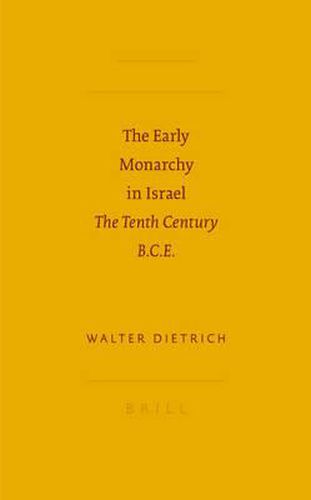Readings Newsletter
Become a Readings Member to make your shopping experience even easier.
Sign in or sign up for free!
You’re not far away from qualifying for FREE standard shipping within Australia
You’ve qualified for FREE standard shipping within Australia
The cart is loading…






The Hebrew narrative art achieves its highest level in the stories of Saul, David, and Solomon. But beyond that, the description of these all-too-human characters and the dramatic events of the birth of the Israelite state depicts a change of eras that became determinative for half a millennium of Israelite history. In this volume Dietrich introduces readers to the stories of the early Israelite state from a variety of perspectives: literarycritical, historical, and theological. After tracing how biblical and extrabiblical texts describe the period, Dietrich skillfully untangles the knotty questions related to the history of the period and perceptively examines the development of this literary corpus as well as the other biblical material that came to be associated with it. In a concluding chapter Dietrich revisits the stories of Saul, David, and Solomon to explore what they teach about theological issues of enduring significance, what they teach about God, humanity, the state, the use of force, and the relationship between women and men.
Paperback edition is available from the Society of Biblical Literature (www.sbl-site.org)
$9.00 standard shipping within Australia
FREE standard shipping within Australia for orders over $100.00
Express & International shipping calculated at checkout
The Hebrew narrative art achieves its highest level in the stories of Saul, David, and Solomon. But beyond that, the description of these all-too-human characters and the dramatic events of the birth of the Israelite state depicts a change of eras that became determinative for half a millennium of Israelite history. In this volume Dietrich introduces readers to the stories of the early Israelite state from a variety of perspectives: literarycritical, historical, and theological. After tracing how biblical and extrabiblical texts describe the period, Dietrich skillfully untangles the knotty questions related to the history of the period and perceptively examines the development of this literary corpus as well as the other biblical material that came to be associated with it. In a concluding chapter Dietrich revisits the stories of Saul, David, and Solomon to explore what they teach about theological issues of enduring significance, what they teach about God, humanity, the state, the use of force, and the relationship between women and men.
Paperback edition is available from the Society of Biblical Literature (www.sbl-site.org)